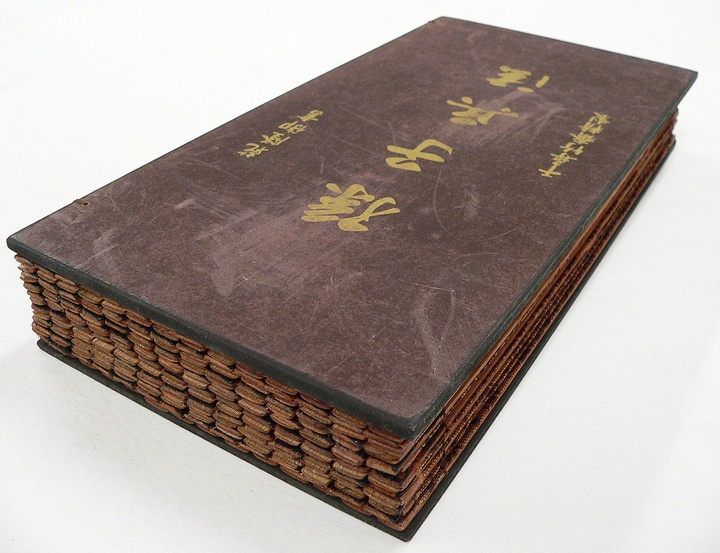(On
the Iraq war) I think they’re in the last throes, if you will,
of the insurgency.
— Vice President Dick Cheney, May 31, 2005
###

Sun Tzu’s 5th century BC “Art of War” (Chinese bamboo book, University of California, Riverside. Creative Commons) closed to display the cover. This copy of The Art of War (on the cover, “孫子兵法”) by Sun Tzu is part of a collection at the University of California, Riverside. The cover also reads “乾隆御書”, meaning it was either commissioned or transcribed by the Qianlong Emperor.
###
I’m not sure if I’m a pacifist, and possibly not a Buddhist, despite what I told Mr. Nakamura 20 years ago. I’d been living in the U.S. on a green card for two decades as a resident alien with a Canadian passport, paying taxes, staying out of trouble, never giving citizenship a thought. I’ve never been much of a nationalist, patriot or flag waver, considering this planet far too small and vulnerable for us-and-them politics and wars.
Then I happened upon a news item in the back of our local paper: a group of Republican senators were mulling the idea of cutting Social Security benefits for non-citizens. Where neither sentiment nor ideology moved me, economics could and did. A few months later, I was sitting at a desk in the San Jose INS office as Mr. Nakamura went over my application.
“Why you not willing to bear arms?” he asked. Oh yeah, that’s right, on the second page, I was asked if I had any problem with the Oath of Allegiance I’d be taking, and instead of giving a straight yes/no answer, I’d fumbled around with the part where I had to promise to:
“…support and defend the Constitution and laws of the United States of America against all enemies, foreign and domestic; that I will bear true faith and allegiance to the same; that I will bear arms on behalf of the United States when required by the law…”
“Um. Well, I’m a Buddhist,” I said, adding, “I don’t believe in violence.” Possibly a lie — a gray area, at the least. He looked me in the eye. “I am Buddhist. I serve in U.S. Army, no problem. What your problem? You say ‘yes’ here, OK?”
And really, what was my problem? No one was going to ask me to start shooting “enemies, foreign and domestic” at my age. Just go along with it, Barry. Yet some perverse limbic brain function took over and I told him I couldn’t. He sighed. This freaking peacenik here was screwing up his day. “When you become Buddhist?” I thought back. I suppose I’d started conflating Buddhism and pacifism back in the good old days of the Nuclear Freeze movement. I told him so. “You prove this?” I could, yes, I’d been an ardent letter writer and op-ed contributor. “I can show you my pacifist writing.” “You come back, show me.”
And so it was, a month later, that Mr. Nakamura examined my newspaper tearsheets from the mid ’70s with ledes like, “Ten Myths about the Arms Race” and “Why ‘First Strike’ Won’t Work.” “You wait,” he said, heading off down the hall clutching my pleas for nuclear sanity. He was back in five minutes. “Boss says OK.” And that was it, my application for citizenship had a waiver about bearing arms, I was silent during that part of the Oath. And here I am.
###
But am I really a pacifist? Are any of us, if we were faced with a life or death decision, especially with family to defend? Of course not. (The Buddhist line was a red herring; Buddhism can be as bloodthirsty as any other of the world’s nominally peace-loving religions, as I realized during my two spells in Sri Lanka.)
All of the above is a prelude to noting that the Trump administration is calling for yet more money for the U.S. military while cutting State Department funds. We already spend more on our military than the next eight nations combined, that is, over a third of global military spending. But it’s not enough, apparently.
Because, somehow, the power-brokers of this country have confused “strong military” with “ability to bring about peace.” If that was the case, we wouldn’t still be in Iraq, Afghanistan, Libya, Syria; we’d have helped bring about an end to warfare there instead of radicalizing young people who would otherwise be living productive lives.
Didn’t our experience in Vietnam, not to mention our ongoing adventurism in the Middle East, teach us anything? You don’t defeat enemies, you turn them into friends. It’s called diplomacy, working for the common good. Big picture diplomats are essential to bringing wars to an end and avoiding getting into them in the first place.
DJT disagrees, apparently, with his proposed 29 percent cut to State Department funding.
Sun Tzu got it right 2,500 years ago: “The supreme art of war is to subdue your enemy without fighting.” Which, I guess, is too subtle for our current leadership.
CLICK TO MANAGE